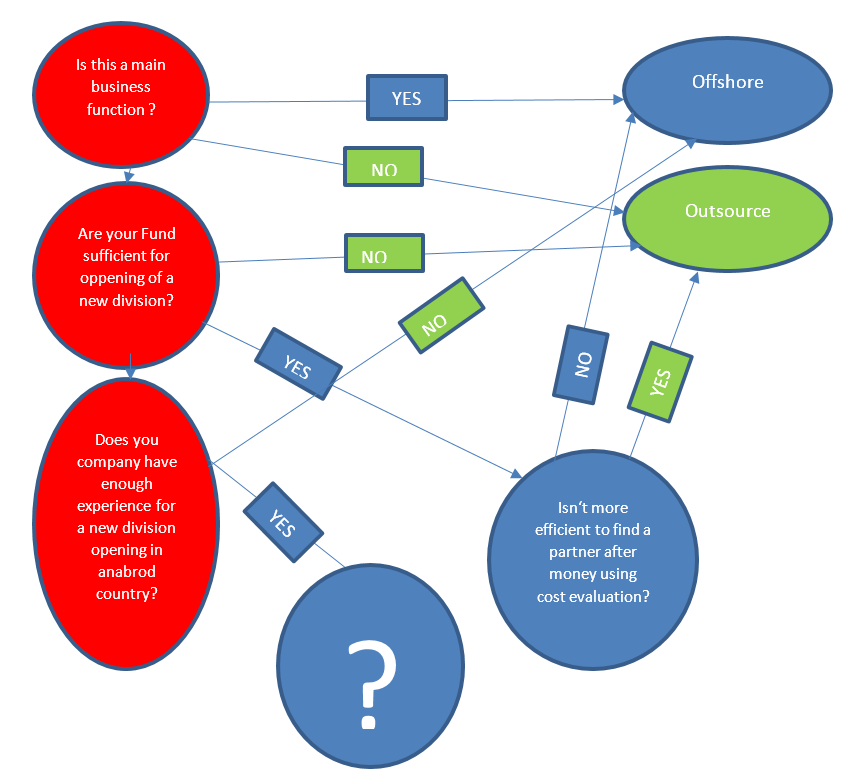A growing number of companies optimise their operations and solve the issue of staff shortage by outsourcing some of operational functions to other countries. It is very easily done these days, as the majority of the functions of modern companies can be performed with quality in any location of the world. Globalisation has given a huge boost to the economy; however, at the same time it made everyone realise how co-dependent we all are; one country’s problem of today may become our problem of tomorrow. All this influences the movement of companies and alters the map of foreign investments. There is a dilemma as to whether it is still worth to outsource or offshore, which countries to choose and which functions better to outsource or offshore. We will more comprehensively discuss the issue in this article. I would also like to point out that in most articles of specialised literature the concepts of outsourcing and offshoring are equalised; however, they are different, as in one case companies transfer their operations to other companies in their own or foreign country, while in the other case the companies establish their branches in foreign countries; therefore, this article will separate these two concepts, and outsourcing will further be understood as the transfer of certain functions to a foreign company.
Why Companies Choose to Outsource/Offshore and What Are the Main Risks and Threats Related to this Action?
The main reasons why companies transfer their operations or authorise partners to perform them on their behalf:
Analysing the opinions of company managers in the press, a conclusion suggests itself that it is worth to both outsource and offshore, if it is in line with the objectives and vision of a company; nevertheless, issues are unavoidable in quite a number of cases. The majority fear and are unwilling to make the decision regarding outsourcing or offshoring but it is a big mistake, as nowadays it is vital: if you are not flexible enough, you will be unable to quickly respond to situations forming in the market and soon will not stand the competition and be shut down; while the transfer of certain processes of a company to others or opening a branch in another location helps you become more flexible and reduce the price of your main offering.
The table below presents the benefit, risk and threats of outsourcing and offshoring:
| Oustsource | Offshhore |
|---|---|
Benefit:
|
Benefit:
|
Risk and threats:
|
Risk and threats:
|
Concluding the information presented in the table, the main differences are the following: in the cases of offshoring, companies involve more and have more control but it requires more financial input, and at the same time there is a risk related to the lack of the knowledge of business environment; but generally it is cheaper to offshore than to outsource in most cases. One might think it is more profitable to offshore, but then one assumes more risk and, in case of a setback, the outcomes may be painful, especially to SMEs. In any case, it is important to assess all risks, to perform a detailed research when selecting the partner – it will help you avoid possible mistakes and make the most of all opportunities.
In case of offshoring, it is crucial to:
- Properly select the country. Pay special attention to the tax base, national and political stability; consider the risk of wars and the government’s attitude towards foreign investment.
- Assess your financial capacity. Assess all costs related to opening a centre or a production branch in another country; decide which funds you will use: own or loaned by bank; what the costs of using the money will be; make sure you will not suffer drastic outcomes in the case of a setback or withdrawal.
- Evaluate the country’s infrastructure. Find out whether the selected country has proper infrastructure for your activity (roads, ports, other transport nodes, internet etc.); whether the country has a connection to the markets you are willing to approach or to the parent country; estimate the costs of logistics.
- Assess the professional level of people living in the country. Will you find enough employees with required qualification; evaluate whether the differences in mentality will not negatively impact your service or production quality.
In case of outsourcing, it is crucial to:
- Make sure that the process you want to transfer is not the main one, creating the competitive advantage. The idea is simple: you can transfer many services or goods, both production and management as well as performance functions; but you have to assess whether it will not deprive you of the competitive advantage; it is as important to assess the risk of plagiarism. You cannot transfer strategically important functions directly related to income.
- Properly select the partner. Assess the partner’s professional history; find out whether they have not been involved n confidentiality scandals; the way they communicate or propose flexible cooperation conditions and clear and flexible payment terms; whether they provide warranty to their work.
- Assess the professional level of people living in the country. Will you find enough employees with required qualification; evaluate whether the differences in mentality will not negatively impact your service or production quality.
- Assess whether the partner knows technology they will work with. Assess whether the partner knows the modern technology related to your service or product, whether they know and implement up-to-date management systems (Lean, Scrum etc.).
- Perform cost – benefit analysis. Assess whether the received service is not unreasonably expensive compared to what you could get from other partners. Assess value for money.
Where to Transfer Operations or Open a Branch?
There is rather a broad selection of countries: Asian countries, the Baltic States, Europe, the Americas, Africa, the Middle East. The most popular locations at the moment: India, the Philippines, China, Malaysia, Vietnam, Poland, Ireland, Costa Rica, Sri Lanka, Brazil, the Czech Republic, Africa, Bulgaria, Argentina, Uruguay and many others. Analysing the list of all the countries, a trend emerges, which shows Asian countries are still the most popular for outsourcing/offshoring, as well as other countries with growing economy, although the situation is generally aggravated for economic, political and geopolitical factors, eg. tense relations between Russia, the West and the USA; Western sanctions to Russia; the fall of oil prices; wars in the Middle East; terrorism; refugee problems in Europe; the world still suffering the outcomes of recession; the slowdown of the Chinese economy; potential exit of key EU member states from the Community etc. All these factors rearrange the map of outsourcing, prompting additional opportunities to European countries: Ireland, Poland, Lithuania, Estonia, Latvia, Hungary and etc. which are calmer and more stable. Overall, many countries currently compete for foreign investments, not only emerging markets; therefore, the competition rises, which is in favour to foreign investors.
The criteria to be taken into account when selecting the country:
- Employee qualification, education and the knowledge of languages
- Employee costs compared to other countries
- Value for money
- Connection to other countries, especially the markets you are willing to approach
- Does the country have sufficient resources that you need
- Tax base favourable for your specific product or service
- Cultural differences
- Stability of the political situation
It is still cheapest to outsource to Asian and South American countries. As the practice of other companies, especially those outsourcing intellectual functions, shows, the services of countries with different cultures, eg. India, China, are disappointing; the quality is not satisfying due to different time zones; different mentality etc.; therefore, many countries look at the member states of the European Union due to the convenience, similar mentality, good professional ethics etc. Approach to own markets is influenced by increasing competition, technological innovations, sharing economy, as these days more often than not one has to be the first or better than the competitor; it is not enough to be cheaper any more, so special attention must be paid to quality, flexibility and promptness, which is often hard to get from growing economies due to delayed problem solving, defects or a different understanding of the issue itself, its solutions, let alone prompt resolution.
If we classified activities according to business processes, areas which do not require highly-qualified employees or processes which do not require special supervision are transferred to emerging markets, i.e. production (not key parts or production); call centres; information upload services etc. When it comes to more important processes and employees of higher qualification, who are needed for the management of operation or service centres, development or management of IT infrastructure, architecture and implementation of engineering solutions, finance management, various researches, logistics etc., European countries are of better use – or neighbouring but more affordable locations.
How to Decide Whether to Offshore or Outsource?
Once you have made a firm decision to transfer operations, you need to find out whether it is better to open a branch in a foreign country or to find a partner that would do it for you. The decision is not an easy one, as you have already gone through the pros and cons of each option.
I will further provide the main questions, which will help in the decision-making.

Looking at the scheme, we could state that large, experienced and financially strong companies would benefit more from offshoring, but then again, one needs to assess the costs of using money, the time required to open a branch, available know-how etc., and to decide whether the presumable money saving and more control will not turn into additional costs and impact flexibility. SMEs should definitely outsource, as they usually do not have the experience, financial means, and their competitive advantage is flexibility and niche products requiring speed and flexibility, which a well-chosen partner could provide.
Generally, it is beneficial to outsource if it is not the main function, as transferring it you risk losing your competitive advantage, and you should be determined when doing so – as the main law of finance prompts, money is more valuable today, and as the key law of competitive advantage suggests, you should use every new opportunity today, and even better if you did it yesterday.


